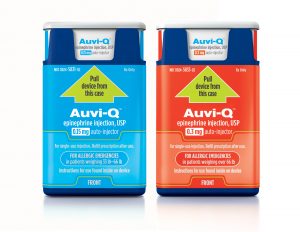 A competitor to Mylan’s EpiPen is set to return to the market starting in February. The Auvi-Q is an epinephrine auto-injector sold by Virginia-based manufacturer Kaleo. The auto-injection adrenaline system is a lifesaving product that wards off anaphylactic shock during a severe allergy attack. The device was previously recalled in 2015 for what the FDA called a “potentially inaccurate dosage delivery.”
A competitor to Mylan’s EpiPen is set to return to the market starting in February. The Auvi-Q is an epinephrine auto-injector sold by Virginia-based manufacturer Kaleo. The auto-injection adrenaline system is a lifesaving product that wards off anaphylactic shock during a severe allergy attack. The device was previously recalled in 2015 for what the FDA called a “potentially inaccurate dosage delivery.”
The injector will be available free of charge for some patients. Kaleo will offer the Auvi-Q for free to the roughly 200 million patients with commercial insurance. Kaleo CEO Spencer Williamson said, “No epinephrine auto-injector, branded or even generic, will cost a commercially insured patient less out of pocket than Auvi-Q.”
Uninsured patients who belong to households earning less than $100,000 will also be able to get the auto-injector for free. Those with government insurance will have to work with their own insurers to figure out how much they’ll have to pay for the device. It is expected that some Medicare and Medicaid plans will cover the auto-injector. Other patients who do not have government or private insurance will be able to buy the Auvi-Q at a cash price of $360 for a two-pack.
Kaleo executives have said that no one will actually pay the list price for the devices. Even insurance companies will get rebates and discounts. Some analysts estimate that even with a 30 percent or 40 percent discount to insurers, Kaleo would make money on the devices.
The announcement comes one week after CVS reported its intention to introduce an EpiPen alternative known as Adrenaclick. This generic version of an EpiPen alternative has a list price of $110 for a two-pack. However, CVS is offering a coupon that will deduct $100 from the price, so most customers will pay only $10.
Mylan’s EpiPen costs $600 for a two-pack. The company recently came under fire for hiking the price of the EpiPen more than 400 percent since 2007. The company was bashed by parents, politicians, and consumer watchdogs. Mylan has since offered coupons for the devices and released a generic version, which costs $300 for a two-pack.
